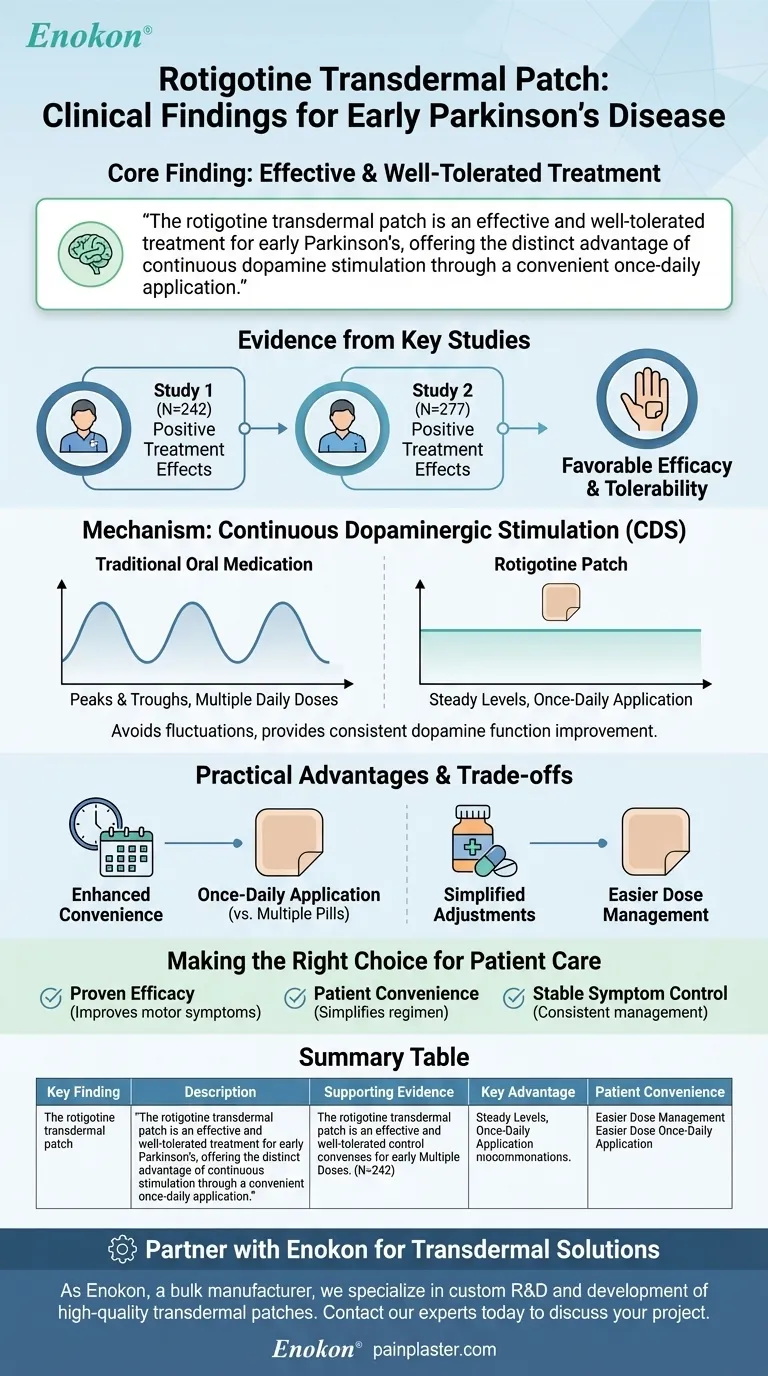In short, clinical studies found that rotigotine transdermal patches provide positive and effective treatment for patients with early Parkinson's disease. Two key studies involving 242 and 277 patients respectively demonstrated favorable clinical efficacy and tolerability, establishing the patch as a valuable therapeutic option.
The core finding is that the rotigotine transdermal patch is an effective and well-tolerated treatment for early Parkinson's, offering the distinct advantage of continuous dopamine stimulation through a convenient once-daily application.

The Core Finding: Efficacy in Early-Stage Disease
Evidence from Key Studies
Two separate clinical studies, one with 242 patients and another with 277, both showed positive treatment effects for the rotigotine transdermal patch in early Parkinson's disease.
Defining "Favorable Efficacy"
The positive outcomes are linked to the patch's ability to increase dopamine function in the brain. This mechanism directly addresses and improves motor symptoms, such as the slow movements characteristic of Parkinson's.
General Tolerability
Across the studies, the rotigotine patch has demonstrated a profile of favorable tolerability, making it a viable option for ongoing, long-term treatment.
How Rotigotine Works: The Advantage of Continuous Stimulation
A Different Delivery System
The rotigotine patch is a dopamine agonist delivered transdermally (through the skin). This provides a fundamentally different approach compared to traditional oral medications.
The Power of Continuous Delivery
Its primary advantage lies in providing continuous dopaminergic stimulation. The once-daily patch maintains a steady level of medication in the body, avoiding the peaks and troughs associated with oral drugs taken multiple times a day.
Impact on Complex Motor Functions
This steady delivery may offer unique benefits. For example, research has been conducted to compare its effects against oral levodopa on complex actions like swallowing, exploring the potential advantages of a more consistent therapeutic effect.
Understanding the Practical Trade-offs
Enhanced Convenience and Adherence
The most significant practical benefit of the patch is its once-daily application. This simplifies the treatment regimen compared to oral medications that may need to be taken three times a day, which can improve patient adherence.
Simplified Dose Adjustments
Making changes to the treatment dosage can also be more straightforward with a patch system compared to managing multiple daily pills.
Making the Right Choice for Patient Care
- If your primary focus is proven efficacy: Clinical studies confirm that rotigotine transdermal treatment shows favorable and positive results for managing early Parkinson's disease.
- If your primary focus is patient convenience: The once-daily patch offers a significant practical advantage over oral medications that require more frequent dosing.
- If your primary focus is stable symptom control: The patch's mechanism of continuous dopaminergic stimulation is designed to provide more consistent management of motor symptoms.
Ultimately, the rotigotine transdermal patch stands as a validated and practical therapeutic tool for managing the symptoms of early Parkinson's disease.
Summary Table:
| Key Finding | Description | Supporting Evidence |
|---|---|---|
| Proven Efficacy | Improves motor symptoms in early Parkinson's disease. | Two clinical studies with 242 and 277 patients showed positive treatment effects. |
| Favorable Tolerability | Demonstrated a profile suitable for long-term treatment. | Well-tolerated across clinical studies. |
| Key Advantage | Provides continuous dopaminergic stimulation (CDS). | Steady drug levels from once-daily patch vs. peaks/troughs of oral medication. |
| Patient Convenience | Simplifies treatment regimen and improves adherence. | Once-daily application is easier to manage than multiple daily pills. |
Looking for a reliable manufacturing partner for your transdermal patch needs?
As Enokon, a bulk manufacturer of reliable transdermal patches and pain plasters, we specialize in supporting healthcare and pharmaceutical distributors and brands. Our technical expertise in custom R&D and development ensures you receive high-quality, effective products tailored to your specifications, just like the rotigotine patch discussed here.
Let us help you bring innovative and convenient treatment options to market. Contact our experts today to discuss your project.
Visual Guide

Related Products
- Far Infrared Heat Pain Relief Patches Transdermal Patches
- Herbal Eye Protection Patch Eye Patch
- Heating Pain Relief Patches for Menstrual Cramps
- Far Infrared Knee Pain Patch Heat Patches for Pain Relief
- Far Infrared Pain Patch Relief Pain Reliever for Back
People Also Ask
- What did the UK Million Women Study find regarding transdermal versus oral hormone therapy? A Safer Choice for Gallbladder Health
- What are the key features of the Deep Heat Pain Relief Back Patch? Get Up to 16 Hours of Drug-Free Relief
- Are heat patches safe for all body parts? Key Safety Zones and No-Go Areas Explained
- What types of pain can the Deep Heat Pain Relief Back Patch be used for? Targeted Relief for Muscles & Joints
- Can heat patches be used for fresh injuries? Avoid This Common Mistake for Faster Recovery















